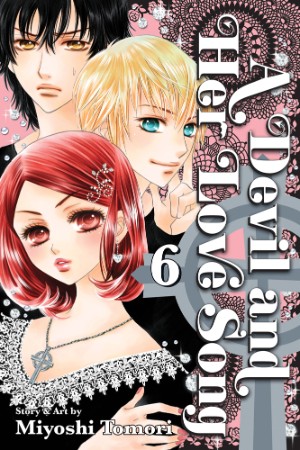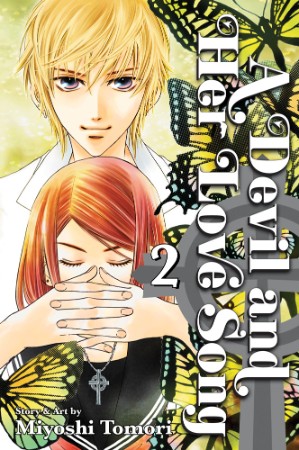By Miyoshi Tomori. Released in Japan by Shueisha, serialized in the magazine Margaret. Released in North America by Viz.
This manga has been on my Bookshelf Briefs stack for the past few volumes, but it completely steps up its game here, so I feel I should do the same. We were in danger of hitting a rut and resolving things too early, with Maria’s latest antagonist, Anna, proving to be another in a series of foes that Maria and her harem… um, friends can win over with honest feelings and stubborn refusal to give up. But in this volume, we see that Anna is made of far sterner antagonist stuff, and steps up her game in a way that tries to both destroy Maria’s life *and* win the affection of Shin.
I’m quite impressed with the author, who has made Anna a villain who ruins the heroine’s life, through the usual shoujo tricks (oh dear, I threw your cellphone into the river by accident) and by things that only Anna could really utilize (telling Shin about Maria’s past). Both work quite well, but the latter really takes hold more than the former. And yet with all that said, it’s somewhat startling that I still really hope that she and Maria can work things out in the end. Maria, as we’ve noted before, *is* genuinely very hard to be around sometimes, and this would have been especially true given what happened between her and Anna. And clearly Anna is not doing this entirely out of pure hatred, given her reaction in that last scene.
Speaking of that last scene, it’s one of the best in the series to date, with Maria once again attempting to sacrifice herself in order to ‘protect’ someone else. Admittedly, this being Maria, it comes from a series of harsh truths and insults, but the heart behind it is there. And Anna can see that heart, which just makes it worse. Her final comment ‘You’re terrible at playing the devil’ is true – Maria is at her worst when she’s wallowing in her own self-hatred and trying to make everyone else see the same things she does.
And then there’s the revelation about Maria’s past that Anna shows Shin. While I’m not sure I buy the whole ‘it’s all Maria’s fault’ that was tossed in, I’m inclined to think the basic facts are true. I like that it took a lot for Shin to buy into this – actual newspaper clippings. Shin is not your typical guy who will believe anything a pretty face tells him. That said, this does affect Shin, but not in the way Anna expects – he’s now hell bent on helping Maria get over the trauma that this has left on her, and his discomfort around her stems from this. And I can see why he’s reacting this way – I mean seriously, how much more tragic can we possibly make Maria’s life?
All this plus we see Yusuke finally making his own move, even if he has to continue to couch it in ‘just kidding’ terms (which is going to come back to kick him in the ass one of these days). I think the audience now knows which pairing we’ll end up with by the end, but there’s 7 volumes still to go, so I’m fine with Yusuke showing he wants to be more than just a romantic runner-up – especially since he doesn’t have the knowledge Shin or Anna do. And by the way, the teacher from hell? Still there, still horrible. HE MUST GO. But the rest of the volume? Awesome.





